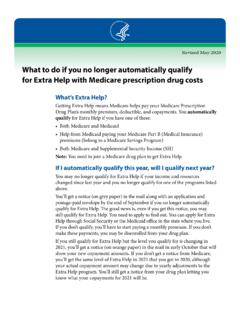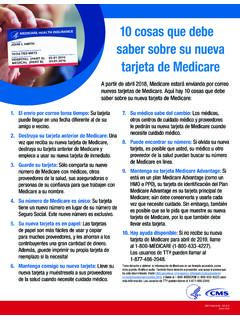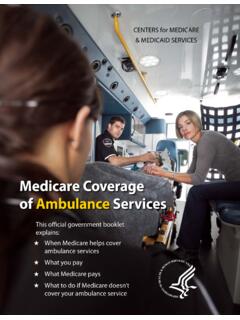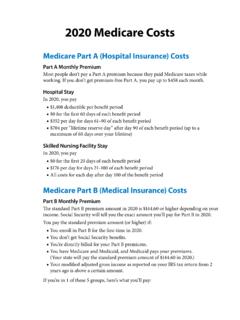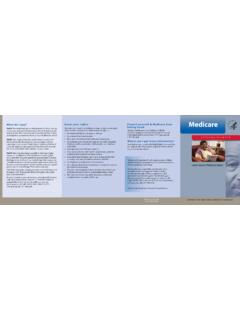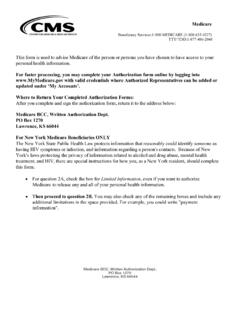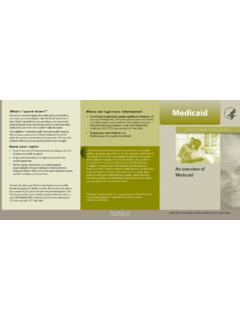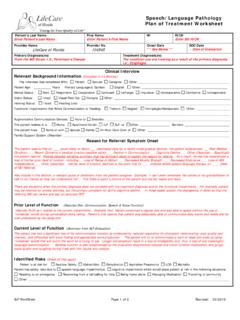Transcription of This official government booklet tells you - Medicare
1 CENTERS for Medicare & MEDICAID SERVICES. Medicare & Home Health Care This official government booklet tells you: Who's eligible What services are covered How to find and compare home health agencies Your Medicare rights The information in this booklet describes the Medicare Program at the time this booklet was printed. Changes may occur after printing. Visit , or call 1-800- Medicare (1-800-633-4227) to get the most current information. TTY users can call 1-877-486-2048. Medicare & Home Health Care isn't a legal document. official Medicare Program legal guidance is contained in the relevant statutes, regulations, and rulings. 3. Table of Contents Section 1: Medicare Coverage of Home Health Care 5. Who's eligible? 5. How Medicare pays for home health care 7. What's covered? 7. What isn't covered? 10. What you pay 10. Advance Beneficiary Notice of Noncoverage (ABN) 11.
2 Your right to a fast appeal 12. Section 2: Choosing a Home Health Agency 15. Finding a Medicare -certified home health agency 15. Home Health Agency Checklist 16. Special rules for home health care 17. Find out more about home health agencies 17. Section 3: Getting Home Health Care 19. Your plan of care 19. Your rights getting home health care 20. Where to file a complaint about the quality of your home health care 21. Home Health Care Checklist 22. Section 4: Getting the Help You Need 23. Help with questions about home health coverage 23. What you need to know about fraud 24. Definitions 27. 4. Home health care Many health care treatments that were once offered only in a hospital or a doctor's office can now be done in your home. Home health care is usually less expensive, more convenient, and can be just as effective as care you get in a hospital or skilled nursing facility.
3 In general, the goal of home health care is to provide treatment for an illness or injury. Where possible, home health care helps you get better, regain your independence, and become as self-sufficient as possible. Home health care may also help you maintain your current condition or level of function, or to slow decline. Medicare pays for you to get health care services in your home if you meet certain eligibility criteria and if the services are considered reasonable and necessary for the treatment of your illness or injury. This booklet describes the home health care services that Medicare covers, and how to get those benefits through Medicare . If you get your Medicare benefits through a Medicare health plan (not Original Medicare ). check your plan 's membership materials, and contact the plan for details about how the plan provides your Medicare -covered home health benefits.
4 5. Section 1: Medicare Coverage of Home Health Care Who's eligible? If you have Medicare , you can use your home health benefits if: 1. You're under the care of a doctor, and you're getting services under a plan of care established and reviewed regularly by a doctor. 2. You need, and a doctor certifies that you need, one or more of these: Intermittent skilled nursing care (other than drawing blood). Physical therapy Speech- language pathology services Continued occupational therapy See pages 8 9 for more details on these services. 3. The home health agency caring for you is approved by Medicare ( Medicare -certified). 4. You're homebound, and a doctor certifies that you're homebound. To be homebound means: You have trouble leaving your home without help (like using a cane, wheelchair, walker, or crutches; special transportation; or help from another person) because of an illness or injury, or leaving your home isn't recommended because of your condition.
5 You're normally unable to leave your home, but if you do it requires a major effort. You may leave home for medical treatment or short, Words in red infrequent absences for non-medical reasons, like an are defined on occasional trip to the barber, a walk around the block or a pages 27 28. drive, or attendance at a family reunion, funeral, graduation, 6 Section 1: Medicare Coverage of Home Health Care or other infrequent or unique event. You can still get home health care if you attend adult day care or religious services. 5. As part of your certification of eligibility, a doctor, or certain health care professionals who work with a doctor (like a nurse practitioner), must document that they've had a face-to-face encounter with you (like an appointment with your primary care doctor) within required timeframes and that the encounter was related to the reason you need home health care.
6 If you need more than intermittent skilled nursing care, you don't qualify for home health services. To determine if you're eligible for home health care, Medicare defines intermittent as skilled nursing care that's needed: Fewer than 7 days each week. Daily for less than 8 hours each day for up to 21 days. In some cases, Medicare may extend the three week limit if your doctor can predict when your need for daily skilled nursing care will end. If you're expected to need full-time skilled nursing care over an extended period of time, you wouldn't usually qualify for home health benefits. Section 1: Medicare Coverage of Home Health Care 7. How Medicare pays for home health care Medicare pays your Medicare -certified home health agency one payment for the covered services you get during a 30-day period of care. You can have more than one 30-day period of care. Payment for each 30-day period is based on your condition and care needs.
7 Getting treatment from a home health agency that's Medicare -certified can reduce your out-of-pocket costs. A Medicare -certified home health agency agrees to: Be paid by Medicare Accept only the amount Medicare approves for their services Medicare 's home health benefit only pays for services provided by the home health agency. Other medical services, like visits to your doctor or equipment, are generally still covered by your other Medicare benefits. Look in your Medicare & You handbook for information on how these services are covered under Medicare . To view or print this booklet , visit You can also call 1-800- Medicare (1-800-633-4227) if you have questions about your Medicare benefits. TTY users can call 1-877-486-2048. What's covered? If you're eligible for Medicare -covered home health care (see page 5), Medicare covers these services if they're reasonable and necessary for the treatment of your illness or injury.
8 Skilled nursing and therapy services are covered when your doctor determines that the care you need requires the specialized judgment, knowledge, and skills of a nurse or therapist to be safely and effectively provided. Skilled nursing care: Medicare covers skilled nursing care when the services you need require the skills of a nurse, are reasonable and necessary for the treatment of your illness or injury, and are given on a part-time or intermittent basis (visits only to draw your blood aren't covered by Medicare ). Part-time or intermittent means you may be able to get home health aide and skilled nursing services (combined) any number of days per week as long as the services are provided: 8 Section 1: Medicare Coverage of Home Health Care Fewer than 8 hours each day 28 or fewer hours each week (or up to 35 hours a week in some limited situations). A registered nurse (RN) or a licensed practical nurse (LPN) can provide skilled nursing services.
9 If you get services from an LPN, your care will be supervised by an RN. Home health nurses provide direct care and teach you and your caregivers about your care. They also manage, observe, and evaluate your care. Examples of skilled nursing care include: giving IV drugs, certain injections, or tube feedings; changing dressings; and teaching about prescription drugs or diabetes care. Any service that could be done safely and effectively by a non-medical person (or by yourself) without the supervision of a nurse isn't skilled nursing care. Physical therapy, occupational therapy, and speech- language pathology services: Your therapy services are considered reasonable and necessary in the home setting if: 1. They're a specific, safe, and effective treatment for your condition 2. They're complex such that your condition requires services that can only be safely and effectively performed by, or under the supervision of, qualified therapists 3.
10 Your condition requires one of these: Therapy that's reasonable and necessary to restore or improve functions affected by your illness or injury A skilled therapist or therapist assistant to safely and effectively perform therapy under a maintenance program to help you maintain your current condition or to prevent your condition from getting worse 4. The amount, frequency, and duration of the services are reasonable Home health aide services: Medicare will pay for part-time or intermittent home health aide services (like personal care), if needed to maintain your health or treat your illness or injury. Medicare Section 1: Medicare Coverage of Home Health Care 9. doesn't cover home health aide services unless you're also getting skilled care. Skilled care includes: Skilled nursing care Physical therapy Speech- language pathology services Continuing occupational therapy, if you no longer need any of the above Part-time or intermittent means you may be able to get home health aide and skilled nursing services (combined) any number of days per week, as long as the services are provided: Fewer than 8 hours each day 28 or fewer hours each week (or up to 35 hours a week in some limited situations).



